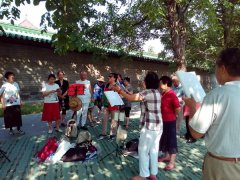Across China: Light in the darkness
TAIYUAN, Oct. 15 (Xinhua) -- Zhang Fubin cannot not see anything, but to many people, he brought them light.
For 17 years, the elderly blind man's library, named the House of Sunshine, has offered free access to more than 5,000 books to residents in Nanchangchi Village, north China's Shanxi Province.
Zhang, 68, fall ill in 1983. After he recovered, he lost his sight. His family took him to many hospitals in Taiyuan, Shanxi's capital, and Beijing, but his sight could not be restored.
"I entered the hospitals with hope, and left in tears," he recalled. "At first I could see dim light, but later everything disappeared from before my eyes."
At the end of that year, two officials from the local civil affairs bureau visited him on a snowy day and gave him 200 yuan (about 30.4 U.S. dollars), which was not a small amount at that time. They encouraged him to open a mill, so he did.
Several years later in 2001, Zhang was listening to broadcast and heard that a farmer Zhao Rongsheng had opened a village library. "That sounded like a good idea," he said.
He located Zhao and with his help, Zhang contacted the Yuxian county government, which donated 2,000 books. Other companies and individuals donated another 1,000 books. He cleaned up his courtyard and made it a venue for people to sit and read.
Now Zhang's House of Sunshine has become a favorite place of children in the village, while some young people have stopped playing cards and picked up books again. From time to time Zhang used his own money to add new books to his library. To date he has spent more than 16,000 yuan.
Pointing at an iron box full of check-out slips, Zhang said he is satisfied. "I can't read the characters myself, but I am happy all the same to know others are reading my books."
SHEDDING LIGHT
Sunday is the White Cane Safety Day. China is home to about six million blind people like Zhang. With the development of the country, many of them have found their lives become easier.
In the Gansu Provincial Library in northwest China, there are two registration books for blind readers. "Almost every day we have blind readers," said Xu Shuangding with the library.
In March 2011, the library launched a project allowing blind people one-to-one service given by library staff.
Pei Xiaoping, 55, visits the library every week almost. "In the past I didn't want to go out," he said. "Now I not only have volunteers pick me up from home, but also enjoy a free lunch here."
During its first year, the project served 800 blind readers. Last year the number grew to 1,297 and Xu estimated that this year it could exceed 1,500.
The library also organizes computer training class for the blind and invites them to listen to subtitled movies.
While Xu was introducing their activities, Yang Haitao, 35, was calling a friend on his mobile phone, something the blind man was not able to do in the past.
"It's thanks to software which reads aloud what is written on the screen," he said.
The software, named Baoyi Yueting which means pleasant listening, was developed by Cao Jun, who was born blind.
Cao taught himself to use computers in 2000 and became a teacher, before he began developing the screen reading software in 2008.
The software has allowed about 430,000 blind people to be able to use smart phones.
"We are no longer cut off from the outside world," Yang said.
"The use of modern technology has not only improved the standard of living for many blind people, but has also helped them learn, integrate into the society and boosted their confidence," said Chang Wei, chairperson of the Blind Persons' Association of Gansu.
In fact, the differences between blind and sighted people are being reduced.
In the past many blind people could only get jobs as massagists, but now they have bigger dreams. At a vocational school for the blind in north China's Shanxi Province, when asked what they wanted to be in the future, students replied "writer," "teacher," "lawyer" and "historian."
China began amending the college entrance exam to make it accessible for blind students in 2014. This year seven students finished the braille version of the exam paper.
"Blind students are equally intelligent," said Zhang Yongliang, headmaster of the school. "May society be more tolerant towards them and give them a broader stage."















